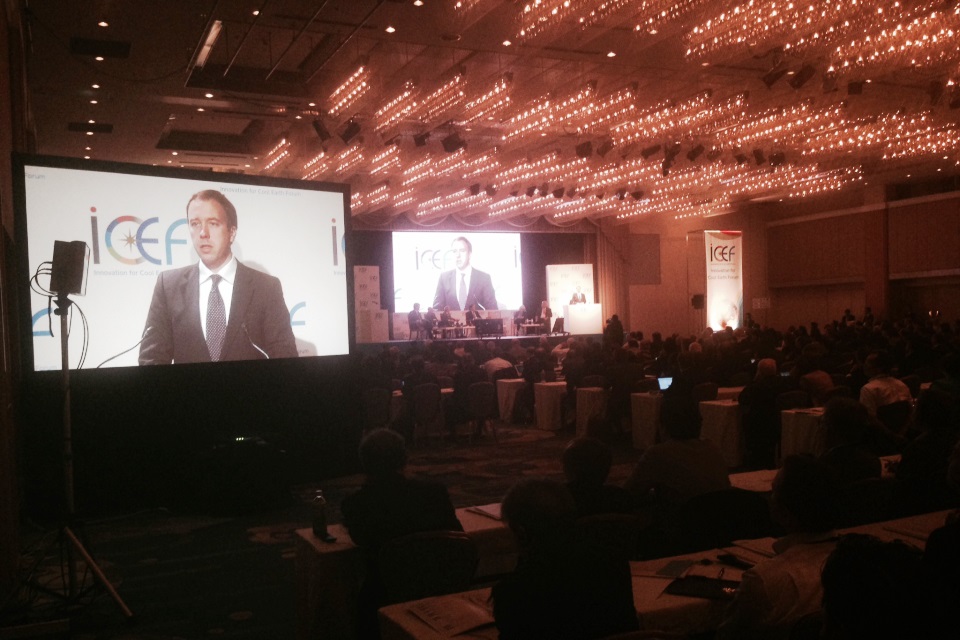Matthew Hancock speech to the Innovation of Cool Earth Forum
Energy Minister Matthew Hancock's speech to the Ministry of Economy, Trade and Industry's (METI) Innovation of Cool Earth Forum in Japan.

Introduction
Almost ten years ago, on my first visit to Kyoto, I was awestruck to be introduced to a tree – a Bonsai tree – that was over 900 years old. I recall being allowed to hold it, and the monks’ calm confidence in its future – at least once I’d put it down.
That tree symbolises our goal at this conference. For no-one owns that tree. The monks are mere custodians. Their duty is to pass on the tree, healthy and strong, that it might outlast them by generations. Our job is to do the same with our earth. The question we face is how.

Matthew Hancock on screen at the Innovation of Cool Earth Forum
Innovation to tackle climate change
At home, to meet our emissions reduction targets we are transforming the UK’s energy system: from highly centralised fossil fuel burning power plants to cleaner, low carbon, more distributed, interconnected and smarter energy.
Our core goal is this: to simultaneously address climate change, and strengthen energy security in the most cost effective way as possible for both consumers and industry.
Yes, this can be done through promoting and subsidising low carbon technologies. The UK does this.
But in the long term, innovation in low carbon technologies will be crucial. It can help businesses become more competitive, reduce energy bills, make our homes more comfortable, and can drive down greenhouse gas emissions.
The power of human ingenuity to tackle this great challenge is already evident. Technology is making low carbon solutions more affordable. Even in cloudy old Britain, solar is shortly set to become cost competitive without subsidy.
Growth of the Global Low Carbon Economy
Businesses are increasingly seeing the opportunity of an expanding global green marketplace worth trillions of pounds and growing all the time. Solar, wind, tidal, nuclear, biomass, CCS and technologies as yet unknown will all have their part to play.
We are attracting record amounts of investment in low carbon of around £29bn since 2010. Our low carbon business sector is booming. 2013, was a record year - with £8bn invested across the range of low carbon technologies. And we estimate up to £50bn of further low carbon investment by 2020.
Investment in renewables has outpaced investment in fossil fuels for the fourth year running.
These opportunities are not only from conventional ‘green sectors’ such as low-carbon energy generation and environmental products. Transport, retail and telecommunications, are delivering opportunities too, as they innovate to develop low-carbon alternatives.
Pound for pound, Yen for Yen, investment in innovation has far greater power than any subsidy regime to rise to this challenge.
And rise we must.
What we have done in the UK
The UK has been at the forefront of developing innovative policies backed up by legislation to drive low carbon innovation.
The UK’s 2050 Calculator, which models emissions and energy pathways, is being replicated across the world, including here in Japan.
Our Energy Act is creating the world’s first low-carbon electricity market. This legislative framework provides certainty to investors and stimulating innovation in low carbon technologies.
The UK government has successfully supported innovation in low carbon technologies. One success story is Artemis, an Edinburgh University spin out company that has developed hydraulic transmission systems to improve efficiency by up to 60%. A grant enabled this company to apply its technology to wind turbines and other renewables, resulting in an acquisition by Mitsubishi Heavy Industries and joint development of efficient transmission systems for large offshore wind turbines.
The UK has taken the lead in offshore wind. We now have more installed offshore wind capacity than the rest of the world combined. Innovation has significantly improved technology and reduced costs. The UK is well placed, with our shallow seas and strong winds, to harness offshore wind potential. But different challenges demand different innovative solutions in other parts of the world. Here in Japan we have witnessed the development of floating offshore turbines.
And we are clear what the role is for Government: not to replicate what companies do best, nor to spend without return, but in a ruthlessly hard-headed approach to stimulate high end research, and help research become commercial reality.
Our support aims to take key technologies - whose potential has been proven in a laboratory - to a stage at which they are proven in real world conditions and are ready for widespread deployment. For energy technologies this is often a costly, high risk and long process and many companies struggle to complete it alone without government funding.
We invest in technically risky projects, but only where the potential benefits justify the investment and where other funders can’t or won’t. Another example is the collaboration between NEDO, hosts for this event, and the UK government in Manchester to deliver heat pumps linked via an innovative smart network IT platform to enable advanced management of energy flows. The project will contribute towards the shift from gas to electricity as the main source of domestic energy in the UK; a shift that will aid the transition to a low carbon energy market in the UK and ultimately help costs too. The project will also help lead to the achievement of Greater Manchester’s ambitious target to reduce CO2 emissions by 48% by 2020.
The Importance of Sharing Views
There is huge scope for cooperation and information sharing on a range of innovative technologies and approaches to support our ambition to tackle climate change. Climate Change is a global problem that demands a global response. Politicians, policy makers, business leaders, academics, and individuals all have a role to play. The challenge is great. But the prize of a sustainable planet for future generations greater still. Let us go and seize it.